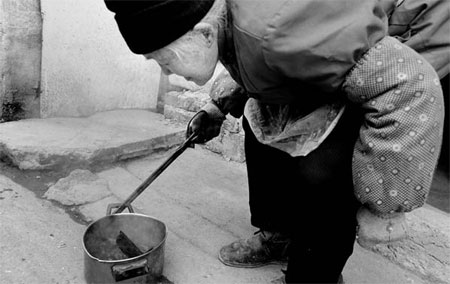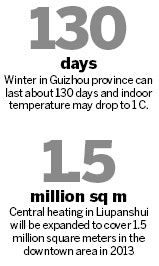Guizhou comes in from the cold
Updated: 2013-01-29 07:52
By Su Jiangyuan in Guiyang and Li Yao in Beijing (China Daily)
|
||||||||
|
An elderly woman stokes a fire to keep warm in Guiyang, Guizhou province, on Jan 13. Wu Dongjun / for China Daily |
Political advisers called for central heating systems to be installed in urban Guizhou province when they gathered for the annual sessions of provincial legislators.
Two political organizations, the China National Democratic Construction Association and Chinese Peasants and Workers Democratic Party, made similar proposals, highlighting the necessity of central heating systems in Guizhou, as their provincial branches attended the meetings scheduled from Jan 25 to 31.
Chen Juli, a cosponsor of the proposal, said winter in Guizhou can last about 130 days (from December to March) and indoor temperatures may drop to 1 C.
"Winter is bone-chilling in Guizhou, because greater humidity adds to the misery," Chen said.
Chen said central heating is safer, more energy efficient and cost-effective compared with air-conditioning, which raises electricity bills up to 2,000 yuan ($322) a month, or gas heating, which has the risk of carbon monoxide poisoning.
The proposal suggested future heating systems be driven by burning coal or gas, using existing power plants or geothermal resources in Guizhou.
Chen said residential areas, schools, hospitals and nursing homes should be among the first to be included in the system, and central heating should be integrated into urban planning.
Yang Chunxing, a senior civil affairs official in Guizhou and another cosponsor of the proposal, said the heating system will follow corporate operations, and financial support will be partly from government subsidies and partly from the private sector.
Yang said installing the heating system will improve the image of Guizhou as a livable province and push forward tourism and other related industries.
Cities such as Liupanshui and Guiyang already have functioning central heating systems in limited areas.
Liang Jian, a provincial legislator and a district head in Liupanshui, said the city allocated 790 million yuan in October to provide central heating coverage for 12 million square meters, and 10-km of underground piping has already been laid out.
Liang said central heating is needed because urban Liupanshui is located at an altitude of 1,800 meters and experiences a freezing and humid winter every year.
The city is rich in coal and will use coal-generated power to support the heating system, which will be working in early February in two pilot areas where the temperature inside will be at least 16 C, said He Yingjie, deputy general manager of Liupanshui Gas Company, which is carrying out the project.
He said central heating will be expanded to cover 1.5 million square meters in the downtown area in 2013, including residential buildings that are now under construction, and some office buildings.
He said the system will not have wide coverage for the time being because houses already built would require costly renovations.
"The central heating supply is unprecedented in southern cities. There are no experiences to learn from," He said.
The system is working around the clock and allows users to monitor costs by checking their water and electricity meters. They can decide how many hours and in which rooms to keep it running, He said.
The charges for heating a 120-square-meter house are estimated to be around 700 yuan a month. People can turn off the system to save money, He said.
In Guiyang, the provincial capital, Guizhou University of Finance and Economics built a geothermal central heating system with costing 200 million yuan. With about 1,000 holes drilled, the system began operations this winter.
Compared with air-conditioning, the geothermal system is said to be 50 percent more expensive to install but saves money in the long run because it is more energy efficient.
Liu Haiying, a designer of the system, said geothermal heating can be widely used in Guizhou, but expenses are considerable because the province's karst landscape makes drilling very difficult.
Another restriction comes from limited underground water, which is used as the geothermal source for the heating system, Liu said.
Contact the writers at sujiangyuan@chinadaily.com.cn and liyao@chinadaily.com.cn
(China Daily 01/29/2013 page4)

 In Photos: 7.0-magnitude quake hits Sichuan
In Photos: 7.0-magnitude quake hits Sichuan
 Li Na on Time cover, makes influential 100 list
Li Na on Time cover, makes influential 100 list
 FBI releases photos of 2 Boston bombings suspects
FBI releases photos of 2 Boston bombings suspects
 World's wackiest hairstyles
World's wackiest hairstyles
 Sandstorms strike Northwest China
Sandstorms strike Northwest China
 Never-seen photos of Madonna on display
Never-seen photos of Madonna on display
 H7N9 outbreak linked to waterfowl migration
H7N9 outbreak linked to waterfowl migration
 Dozens feared dead in Texas plant blast
Dozens feared dead in Texas plant blast
Most Viewed
Editor's Picks

|

|

|

|

|

|
Today's Top News
Live report: 7.0-magnitude quake hits Sichuan, heavy casualties feared
Boston suspect cornered on boat
Cross-talk artist helps to spread the word
'Green' awareness levels drop in Beijing
Palace Museum spruces up
First couple on Time's list of most influential
H7N9 flu transmission studied
Trading channels 'need to broaden'
US Weekly

|

|









